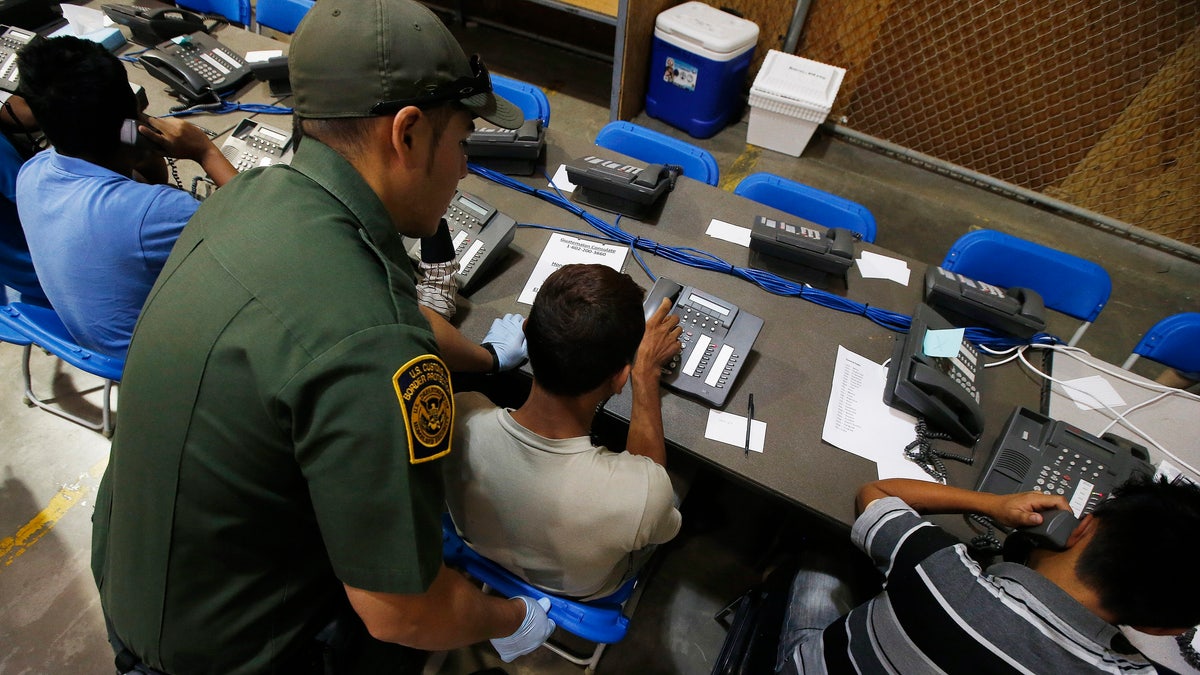
A U.S. Customs and Border Protection officer helps out a few boys who are trying to make phone calls as they are joined by hundreds of mostly Central American immigrant children that are being processed and held at the U.S. Customs and Border Protection Nogales Placement Center on Wednesday, June 18, 2014, in Nogales, Ariz. CPB provided media tours Wednesday of two locations in Brownsville, Texas, and Nogales, that have been central to processing the more than 47,000 unaccompanied children who have entered the country illegally since Oct. 1. (AP Photo/Ross D. Franklin, Pool)
Change is finally coming to America. Despite warnings from opponents of comprehensive immigration reform, President Obama is on the verge of using his executive power to do what Congress has failed to do: address some of the most egregious injustices in our immigration system. Not only is the president well within his constitutional rights to act, but also in doing so he is defending some of America’s most important values.
It would certainly be better if the solution to our current immigration problems were the product of bipartisan collaboration and consensus. But the truth is that President Obama confronts one of the most deeply divided congresses in American history.
For advocates of comprehensive immigration reform, these last six years have been difficult. The White House and Congress have each insisted that they understand the importance of reforming our immigration system only to have anti-immigrant voices or some other issue (the financial crisis, health care reform, etc.) undercut it. With just two years remaining in his presidency, President Obama, in particular, risks failing to deliver on the promise of one of his most important policy objectives. Time is short and we expect the president to act boldly and decisively.
It would certainly be better if the solution to our current immigration problems were the product of bipartisan collaboration and consensus. But the truth is that President Obama confronts one of the most deeply divided congresses in American history. For years, many Republicans in Congress and some Democrats too, have either dragged their feet on immigration reform or flat out refused to negotiate in good faith with the White House. The result of this political impasse has been a dramatic increase in deportations of undocumented immigrants and a series of other enforcement measures that have inflicted great harm and pain to immigrant families and communities. In the lead-up to the midterm elections, President Obama said that while he hoped that he could work with the new Congress on immigration reform, he was prepared to use executive actions to accomplish what Congress would not. The results of the elections suggest that the president will have few partners to work alongside him in a bipartisan fashion. Simply put, if the worst parts of our immigration system are to be addressed in the next two years, it will most likely be because of the actions of the president.
Opponents of executive action say the president lacks the legal authority to “go it alone.” They’re wrong. Historical precedent shows that presidents—from Harry Truman to Ronald Reagan to Bill Clinton—have used their executive authority to change immigration policy. What’s more, in many of these cases, presidential action has actually spurred Congress to produce meaningful legislation. We certainly hope that's the case, because as important as the president's planned actions on immigration are, they will only represent a temporary fix that address certain aspects of our broken immigration system.
The truth is also that both parties in Congress have had ample time to craft a comprehensive reform strategy that honors America’s values, protects communities, and keeps families together. In the absence of any leadership from Congress, the president has a moral obligation to use executive action to provide relief to millions of immigrant families in the United States.
- Opinion: Like it or not, Obama’s immigration action stands on solid legal footing
- Opinion: Can Hispanics survive Obama’s political suicide?
- Opinion: Why Latinos should reject Obama’s immigration decreto
- Ahead of Obama’s immigration plan, Biden announces refugee program for Central American minors
- GOP considers suing President to block him from acting solo on immigration
- The Major Players In The Immigration Debate
The president's executive order must take aim at the most unjust elements of the current system. This is not the time to tinker with the system but to act confidently, courageously, and unapologetically in favor of reform.
Meaningful executive action would include, for instance, an immediate suspension of deportations for undocumented immigrants who pose no threat to our security, as well as broad administrative relief for the overwhelming majority of the nation’s eleven million undocumented residents to remain and work here legally.
Moreover, the president’s plan should go beyond solely covering immediate relatives of citizens, legal permanent residents and DACA recipients and not be limited to those residing here for 10 years or more. Access to affordable health care should also be an integral part of this plan to improve the public health of all our families and communities.
There are eleven million undocumented immigrants in America. They are our neighbors, our co-workers, our friends, and our families. They can’t wait another day for justice and neither should the president. The time for change is now.
